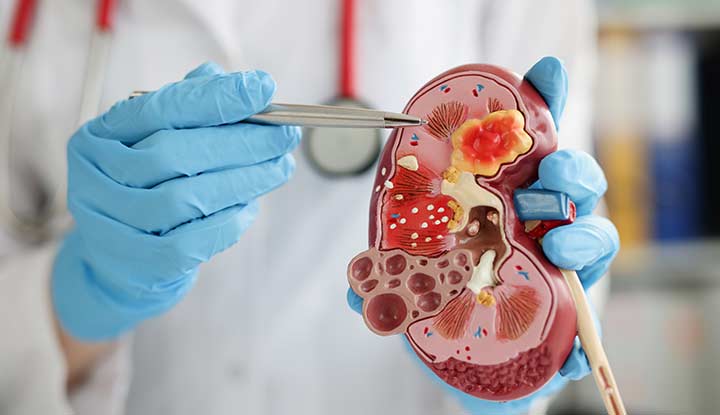A nephrologist is a medical doctor who specializes in diagnosing and treating kidney conditions. You should see a nephrologist if you have signs of kidney disease or other conditions that may damage your kidneys. During your appointment, you may need blood and pee tests.
Advertisement
Cleveland Clinic is a non-profit academic medical center. Advertising on our site helps support our mission. We do not endorse non-Cleveland Clinic products or services. Policy

Image content: This image is available to view online.
View image online (https://my.clevelandclinic.org/-/scassets/images/org/health/articles/24214-nephrologist)
A nephrologist is a medical doctor with expertise in the care of kidneys. Your kidneys are part of your urinary system. They’re bean-shaped organs that filter your blood and remove waste, excess water and electrolytes. These leave your body as urine (pee).
Advertisement
Cleveland Clinic is a non-profit academic medical center. Advertising on our site helps support our mission. We do not endorse non-Cleveland Clinic products or services. Policy
A nephrologist (neh-FRAH-leh-jist) diagnoses and treats kidney conditions and kidney failure. They also recognize how conditions affect other parts of your body. This includes:
Nephrologists can also get additional training in transplant nephrology, interventional nephrology and other specialized areas.
Transplant nephrology specializes in kidney and pancreas transplants. This includes providing care for people who receive the organs.
Interventional nephrology specializes in treating and maintaining access to blood vessels for dialysis. These specialists also perform kidney biopsies.
To become a nephrologist, doctors must complete:
Advertisement
Some of the most common conditions that a nephrologist may treat include:
Common tests and procedures that nephrologists perform may include:
You should see a nephrologist if you have any symptoms of kidney disease. These symptoms may include:
The two diseases that most commonly cause kidney disease are:
If you have diabetes and high blood pressure, ask your healthcare provider if you need kidney disease tests.
It’s also a good idea to see a nephrologist if you have a biological family history of kidney disease. If one of your blood relatives has a kidney disease, you may be at a greater risk of having it, too. A nephrologist can help prevent it or treat its earliest stages.
Advertisement
It helps to first understand how healthcare providers stage kidney diseases. They use a blood test to figure out your estimated glomerular filtration rate (eGFR). Your eGFR tells them how well your kidneys filter your blood (kidney function). A normal eGFR is about 100. That means there aren’t any problems with your kidneys. The lowest eGFR is 0. That means your kidneys don’t function at all.
The stages include:
Primary care providers (PCPs) often check your eGFR at an annual checkup. If they detect any kidney damage, they’ll refer you to a nephrologist. It’s important to see a nephrologist at the earliest stages of kidney disease. The sooner you get treatment, the more likely it is that they can slow down or stop kidney disease from getting worse.
Advertisement
During your first visit with a nephrologist, they’ll:
It’s helpful to prepare for your first appointment with a nephrologist. It’s a good idea to do the following:
Some people also find it helpful to bring a trusted family member or friend with them. They can help take notes, ask questions, schedule tests and remind you about follow-up appointments.
Advertisement
Nephrologists are medical doctors who specialize in caring for kidneys. Your nephrologist can examine you, order blood and pee tests, make a diagnosis, and treat your condition with medication or a procedure. Your PCP may refer you to a nephrologist. They may work together or with other specialists to help treat you.
Before your appointment, it’s a good idea to prepare notes and organize your health information. Be sure to ask any questions that come to mind. Your nephrologist is here to help and offer the best possible support.
Learn more about the Health Library and our editorial process.
Cleveland Clinic's health articles are based on evidence-backed information and review by medical professionals to ensure accuracy, reliability, and up-to-date clinical standards.
Cleveland Clinic's health articles are based on evidence-backed information and review by medical professionals to ensure accuracy, reliability, and up-to-date clinical standards.
If you have a condition that’s affecting your kidneys, you want experts by your side. At Cleveland Clinic, we’ll work with you to craft a personalized treatment plan.
